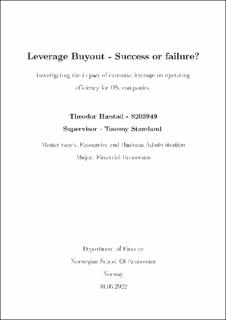Leverage Buyout - Success or failure? Investigating the impact of excessive leverage on operating efficiency for US. companies.
Master thesis
Permanent lenke
https://hdl.handle.net/11250/3014250Utgivelsesdato
2022Metadata
Vis full innførselSamlinger
- Master Thesis [4372]
Sammendrag
This thesis investigates the relationship between excessive leverage on operating efficiency
and lower debt levels. The period spans from 1990 - to 2018; however, the sample is
mainly concentrated around the mid-1990s up to the financial crisis. The thesis builds
on the foundation of agency theory to explain different types of behavior that make firms
eventually inefficient. These firms are presumed to experience severe agency costs, and
the requirement for discipline is best solved by incorporating the monitoring effect of debt.
Running regressions on different operating and financial performance measures shows no
evidence of relatively improved efficiency using higher debt levels.
Moreover, in analyzing differences in firm behavior, such as asset and revenue growth,
there is no evidence that excessive leverage has different firm behavior than using lower
debt levels. However, one compelling finding is that the firms seem to experience substantial
growth in assets and revenue post-transaction, contradicting Jensen's Free cash
flow hypothesis. The findings suggest that the motives for entailing leveraged buyout go
beyond simply improving efficiency. The motives for LBOs, change in attitudes when
incorporating excessive leverage and poor credit monitoring in bull markets, might help
explain why previous research does not systematically improve operating efficiency and
the history of leveraged buyouts.
